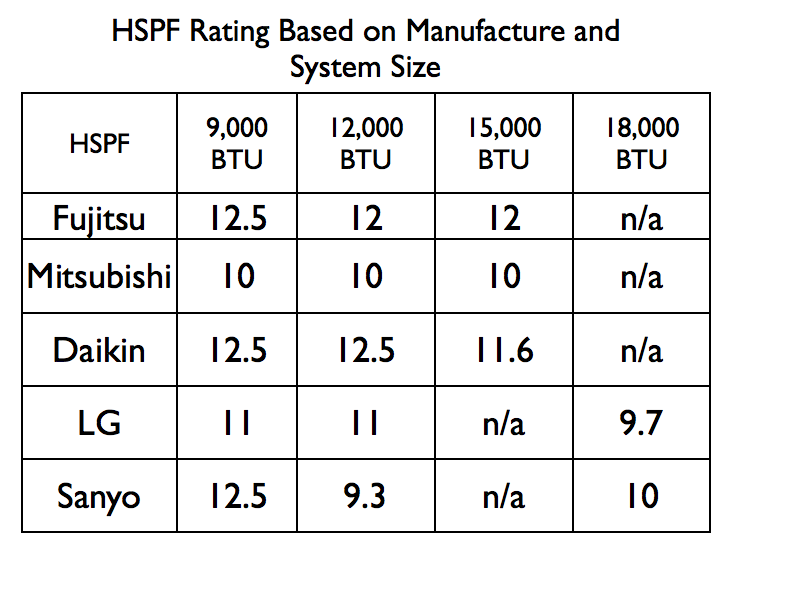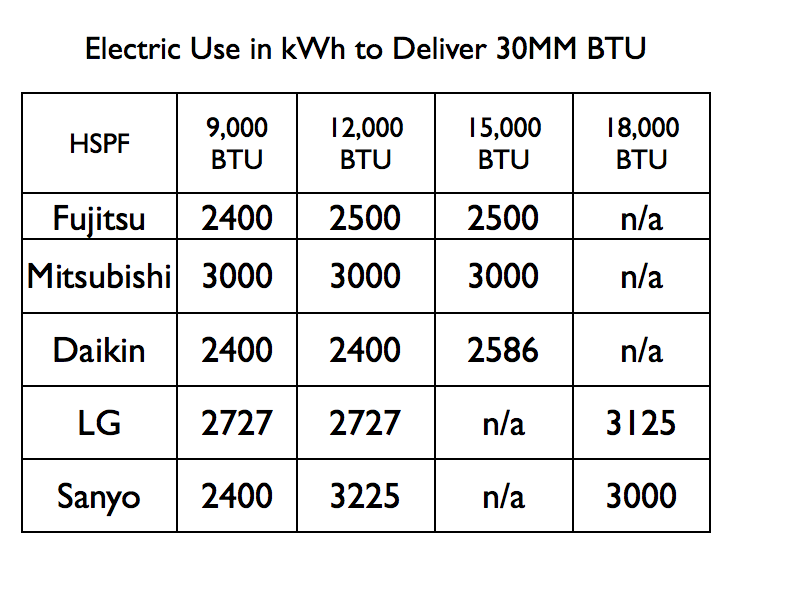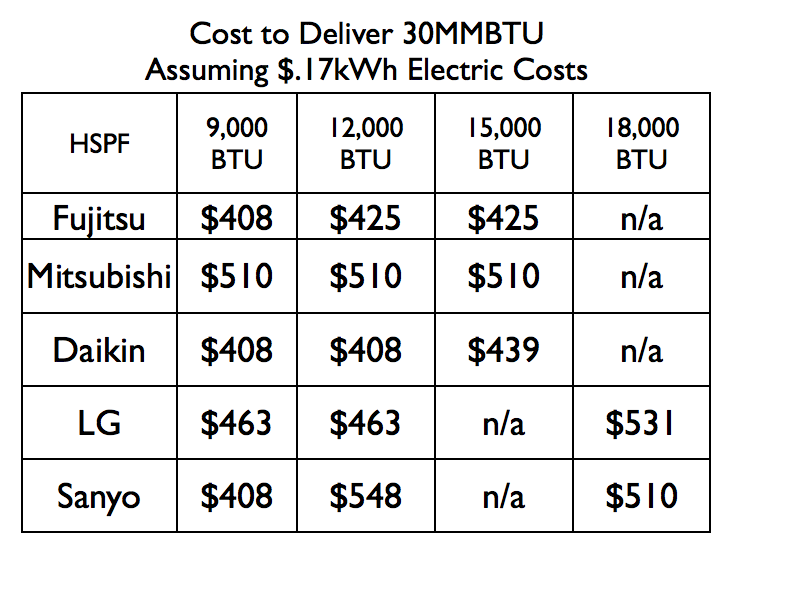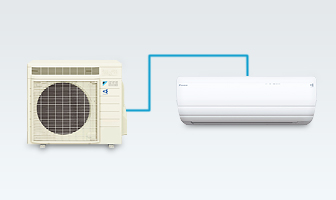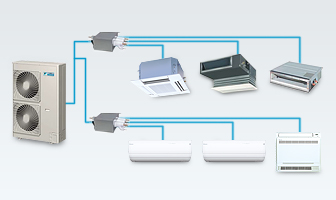This article is part of a free 10 page Cold Climate Heat Pump Buyers Guide. You can download the cold climate heat pump buyers guide here. The guide is based on all of the conversations that we have with everyday homeowners that want to use this technology to lower their oil bill. Most of the literature on the subject is written for technical people in the industry, our guide is written explicitly for homeowners.
In this last article, we discussed how heat pumps work and went into how cold climate heat pumps work. Cold climate heat pumps are heat pumps that can heat in very cold climate climates, like Maine. If you're curious about the performance and ability of heat pumps to heat in Maine, read those articles.
Get Instant Online Heat Pump Cost and Savings Quote
If you live in Maine and would like to get an instant online heat pump quote (including a savings report) for your home, click here to get a heat pump quote.
Cold Climate Heat Pump Review Introduction
In this article, our goal is to share with you how we've identified the best rated heat pump systems for heating Maine. We will provide a deeper dive into the key characteristics that determine the best rated cold climate heat pump systems for use in heating in Maine.
Here's what we'll cover.
This is going to be fun. Let's dive in.
If you have any questions about any of this material, please ask it in the comment section!
Heating Seasonal Performance Factor. How to Measure Heat Pump Efficiency
Before we discuss the manufactures of heat pumps and compare specific units, we need to understand how heat pumps are compared from an efficiency perspective.
Heat pumps are rated by Heating Seasonal Performance Factor or HSPF.
HSPF is very simple metric. It is a ratio of the number of BTUs delivered and the amount of watt-hours is required to deliver those BTUs. BTUs are a measure of heat, more more about that here. This number is calculated by running a heat pump over a specific amount of time and considering the amount of electricity that is required to deliver a specific amount of heat over a range of outside air temperatures.
To provide a very specific example, a heat pump that can provide 100 BTUs while using 100 watts would be twice as efficient as a heat pump that provides 50 BTUs using 100 watts.
There are other considerations when selecting a heat pump, but most of the time, we want to use heat pumps that have the highest HSPF rating because these units provide the most amount of heat using the least electricity.
To review, here's the equation to calculate HSPF over a period of time:
Here's a more real example.
Top 5 Heat Pump Manufactures and Heat Pump Rating Review
There are a growing number of manufactures that manufactures cold climate heat pumps. We've narrowed our cold climate heat pump reviews to 5 major manufactures. There are some knock off units but we wanted to focus on the best.
We made this decision based on a few factors
The manufactures that we reviewed include.
Here are the HSPF rating for each manufacture. We focused on the smallest ductless mini-split system units. These are the most efficient, and we'll explain that in the "other configurations" section below.
Here are the results.
In this last article, we discussed how heat pumps work and went into how cold climate heat pumps work. Cold climate heat pumps are heat pumps that can heat in very cold climate climates, like Maine. If you're curious about the performance and ability of heat pumps to heat in Maine, read those articles.
Get Instant Online Heat Pump Cost and Savings Quote
If you live in Maine and would like to get an instant online heat pump quote (including a savings report) for your home, click here to get a heat pump quote.
Cold Climate Heat Pump Review Introduction
In this article, our goal is to share with you how we've identified the best rated heat pump systems for heating Maine. We will provide a deeper dive into the key characteristics that determine the best rated cold climate heat pump systems for use in heating in Maine.
Here's what we'll cover.
- A review of the Heating Seasonal Performance Factor (HSPF) and why this is critical to understand when thinking about heat pumps. We'll the definition of HSPF and explain how it impacts how much electricity is used to deliver heat. The most efficient heat pumps use the lease amount of electricity to deliver the most amount of heat.
- The top 5 manufactures that are producing cold climate heat pumps. We'll focus on the fujitsu mini split, the daikin heat pump and the mitsubishi heat pump. We'll provide a table that coveres a heat pump rating review and the rating that are used to measure heat pump efficiency.
- Other heat pump considerations. We'll discuss other typical heat pump considerations that homeowners ask about like ducted heat pumps; split systems, and larger units.
- Warranty information details.
- Heat Pump aesethics and size. This is simply a review of what different systems look like on the inside and outside of the building
- Heat pump coverage. How much can a single unit heat?
This is going to be fun. Let's dive in.
If you have any questions about any of this material, please ask it in the comment section!
Heating Seasonal Performance Factor. How to Measure Heat Pump Efficiency
Before we discuss the manufactures of heat pumps and compare specific units, we need to understand how heat pumps are compared from an efficiency perspective.
Heat pumps are rated by Heating Seasonal Performance Factor or HSPF.
HSPF is very simple metric. It is a ratio of the number of BTUs delivered and the amount of watt-hours is required to deliver those BTUs. BTUs are a measure of heat, more more about that here. This number is calculated by running a heat pump over a specific amount of time and considering the amount of electricity that is required to deliver a specific amount of heat over a range of outside air temperatures.
To provide a very specific example, a heat pump that can provide 100 BTUs while using 100 watts would be twice as efficient as a heat pump that provides 50 BTUs using 100 watts.
There are other considerations when selecting a heat pump, but most of the time, we want to use heat pumps that have the highest HSPF rating because these units provide the most amount of heat using the least electricity.
To review, here's the equation to calculate HSPF over a period of time:
- HSPF = BTUs delivered / watt-hours consumed.
Here's a more real example.
- A heat pump with a HSPF of 10 can provide 40,000,000 BTUs (40 million BTUs) by consuming 4,000 kWhs (4 million watt-hours) of electricity.
- Here's the equation. 10 = 40,000,000 BTUs / 4,000,000 watt-hours
Top 5 Heat Pump Manufactures and Heat Pump Rating Review
There are a growing number of manufactures that manufactures cold climate heat pumps. We've narrowed our cold climate heat pump reviews to 5 major manufactures. There are some knock off units but we wanted to focus on the best.
We made this decision based on a few factors
- The length of time manufacturing cold climate heat pumps. We want to focus on the manufactures that have been doing this the longest.
- Size and name recognition of the business. We wanted to focus on name brand businesses with large balance sheets. We can trust that these businesses will be around in 20 years to maintain their warranties.
- Energy star rated.
The manufactures that we reviewed include.
- Fujitus mini splits
- Mitsubishi heat pumps
- Daikin heat pumps
- LG heat pumps
- Sanyo heat pumps.
Here are the HSPF rating for each manufacture. We focused on the smallest ductless mini-split system units. These are the most efficient, and we'll explain that in the "other configurations" section below.
Here are the results.
Here are citations for where I found the information for each of the manufactures efficiency ratings. Feel free to do the research yourself. If you have any questions, please leave them in the comment section.
How do they system efficiencies translate into different amounts of electricity used to provide a specific amount of heat?
Let's assume we're trying to deliver 30,000,000 BTUs to a homeowner over an annual period. Here's the difference in electricity it would take for each unit to deliver this amount of heating capacity.
- Fujitsu Ductless Heat Pumps
- Mitsubishi Minisplit Product Catalog
- LG Single Zone Ductless Heat Pumps
- Sanyo Heat Pumps
- Daikin Heat Pump Product Literature.
How do they system efficiencies translate into different amounts of electricity used to provide a specific amount of heat?
Let's assume we're trying to deliver 30,000,000 BTUs to a homeowner over an annual period. Here's the difference in electricity it would take for each unit to deliver this amount of heating capacity.
Let's look at the cost. If we assume electricity costs $.17kWh, you can see the cost difference below.
This is why in our no money down heat pump program, we almost exclusivity use Fujitsu units, because they provide the most amount of heat for the least cost. This saves homeowners the most money.
Other System Configurations?
We often get questions about other configurations of cold climate heat pumps. There are many other figurations of heat pumps on the market.
The reason we stay away from other configurations, is that the other configurations have a much lower operating HSPF compared to single ductless heat pump systems.
Here are the other system considerations.
Other System Configurations?
We often get questions about other configurations of cold climate heat pumps. There are many other figurations of heat pumps on the market.
The reason we stay away from other configurations, is that the other configurations have a much lower operating HSPF compared to single ductless heat pump systems.
Here are the other system considerations.
- Systems with large nominal output. You'll notice in the above table that as the size of the heat pump increases, it's efficiency decreases. For this reason, we stick with smaller units.
- Ducted systems. In ducted systems, duct is installed to distribute the heat from a central unit around the home. The problem with ducted systems is that a significant amount of energy is lost in duct. The US DOE reports that on average, 20% to 30% of the air is lost while moving through ducts. We need to eliminate in-efficient systems to lower heating costs, so we stay away from ducted systems. The other problem with ducted systems is integrating with existing heating systems. Installing duct takes time.
- Many outdoor units with single indoor unit. While we don't like duct, it's possible to install multiple indoor units. You can see below that it's possible to have a single outside unit (the compressor on the left in both images) connected with a single indoor unit or multiple indoor units. The issue is that when there are many inside units connected with a single outdoor compressor, the HSPF efficiency drops below 10. We don't like units with low efficiencies for residential applications, so we stay away from this.
We focus exclusively on the units to left because these provide the highest efficiency. This means that produce the most amount of heat with the least amount of electricity.
Warranty Information
With all of these heat pumps, the warranty is essential the same.
One manufacture, Daikin, has an extended 10 year warranty. The problem is that there are any certified Daikin installers in the state of Maine (at the moment) that provide this service.
Aesthetics and Heat Pump Size.
A heat pump system consists of an inside and outside unit.
Here are some photos of the inside and outside units. You can see that both the internal and outside unit take minimal space.
Warranty Information
With all of these heat pumps, the warranty is essential the same.
- 5 year parts warranty
- 7 year compressor warranty. Read how cold climate heat pumps work to understand what the compressor does
- With all of our systems, we provide 5 year workmanship warranty.
One manufacture, Daikin, has an extended 10 year warranty. The problem is that there are any certified Daikin installers in the state of Maine (at the moment) that provide this service.
Aesthetics and Heat Pump Size.
A heat pump system consists of an inside and outside unit.
Here are some photos of the inside and outside units. You can see that both the internal and outside unit take minimal space.
Coverage. How much Area Can the Heat Pump Unit Heat?
Heat pumps can provide heating and cooling for an area between 400 and 1,400 square feet. They can provide heating for areas smaller and larger than this, but they are the most efficient in this size.
The specific amount of space they can heat depends on a few key factors.
Download the Free 10 Page Cold Climate Heat Pump Buyers Guide
We've created a free buyers guide based on the hundreds of conversations we'd have with homeowners.
Click here to download the guide.
Here's what's included in the guide
Click here to download the guide.
Heat pumps can provide heating and cooling for an area between 400 and 1,400 square feet. They can provide heating for areas smaller and larger than this, but they are the most efficient in this size.
The specific amount of space they can heat depends on a few key factors.
- The layout of your home. Because ductless heat pumps distribute a "point source" heat, it's best if they're installed in a central location that is open. An open floor plan means that there are a few rooms that are not separated by doors that are often closed. Most often, kitchens, living rooms, and dining rooms are connected. In older homes, where each individual room is actually it's own room, this can be a problem.
- The efficiency of your house. How much heat do the walls let in. Heat pumps can heat larger areas in more efficient shells and less area in less efficient shells. When we say "efficient shell", we mean how much heat do your walls let out during the winter.
- The placement of the unit within the home. This relates to point number one. Heat pumps need to be installed in a central location to heat the maximum amount of space.
- The size of the heat pump itself. Larger heat pumps can heat larger areas, if the area is sufficiently open for the heat to spread.
Download the Free 10 Page Cold Climate Heat Pump Buyers Guide
We've created a free buyers guide based on the hundreds of conversations we'd have with homeowners.
Click here to download the guide.
Here's what's included in the guide
- How heat pumps work, in simple to understand language.
- Heat pump reviews. Which heat pump models work best for heating in Maine.
- [Free Tool] Heat pump saving calculator. Determine how much you can save.
- Buying vs renting. A checklist to determine the best option for you and your family.
- How to find the best contractor to install your heat pump.
- The top 13 questions to ask every contractor to find the best one.
- A list of government programs and rebates available, so you don't have to waste a lot of time on research!
- Much more!
Click here to download the guide.
